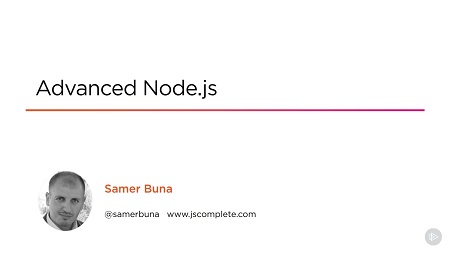
English | MP4 | AVC 1280×720 | AAC 44KHz 2ch | 3h 45m | 423 MB
This course will teach you the core Node.js concepts and API modules from simple utility modules all the way to streams and clusters.
Learn how to answer most of the questions an experienced Node developer is expected to answer. In this course, Advanced Node.js, you’ll learn the core Node.js concepts and API modules from simple utility modules all the way to streams and clusters. First, you’ll discover Node’s architecture and dependencies and how the require module and it’s 5 major steps. Next, you’ll explore the event-loop and it concurrency model and also about event emitters, callbacks, and promises. Then, you’ll be working with TCP, UDP, HTTP, HTTPS, os, fs, console, and util. Finally, you’ll learn about readable, writable, and transform streams and will also learn how to use the child process module and load balancing with the cluster module. By the end of this course, you should be comfortable understanding advanced code written in Node, and writing efficient and scalable node modules and packages.
Table of Contents
01 – Course Overview – Course Overview
Node != JavaScript
02 Is This Course for You
03 Course Overview
04 Node’s Architecture – V8 and libuv
05 Node’s CLI and REPL
06 Global Object, Process, and Buffer
07 How require() Actually Works
08 JSON and C++ Addons
09 Wrapping and Caching Modules
10 Know Your NPM
11 Summary
Concurrency Model and Event Loop
12 Introduction
13 What Is I_O Anyway
14 The Event Loop
15 The Call Stack
16 Handling Slow Operations
17 How Callbacks Actually Work
18 setImmediate and process.nextTick
19 Summary
Node’s Event-driven Architecture
20 Callbacks, Promises, and Async_Await
21 Event Emitter
22 Arguments, Errors, and Order of Listeners
23 Practical Example – Task List Manager
24 Summary
Node for Networking
25 TCP Networking with the Net Module
26 Working with Multiple Sockets
27 Improving the Chat Server
28 The DNS Module
29 UDP Datagram Sockets
30 UDP Summary
Node for Web
31 The Basic Streaming HTTP Server
32 Working with HTTPS
33 Requesting HTTP_HTTPS Data
34 Working with Routes
35 Parsing URLs and Query Strings
36 Summary
Node’s Common Built-in Libraries
37 Working with the Operating System
38 Working with the File System
39 Console and Utilities
40 Debugging Node.js Applications
41 Summary
Working with Streams
42 Stream All the Things!
43 Streams 101
44 Implementing Readable and Writable Streams
45 Duplex Streams and Transform Streams
46 Summary
Clusters and Child Processes
47 Scaling Node.js Applications
48 Child Processes Events and Standard IO
49 The Shell Snytax, exec(), and execFile()
50 The fork() Function
51 The Cluster Module
52 Load-balancing an HTTP Server
53 Broadcasting Messages to All Workers
54 Availability and Zero-downtime Restarts
55 Shared State and Sticky Load Balancing
56 Summary
57 – Course Wrap Up – Course Wrap Up
Resolve the captcha to access the links!